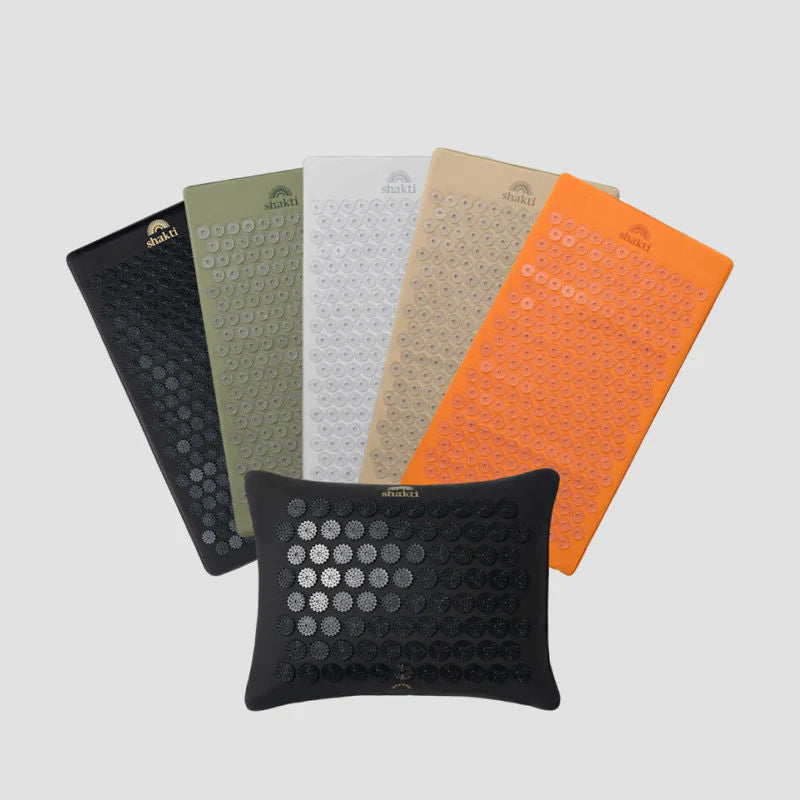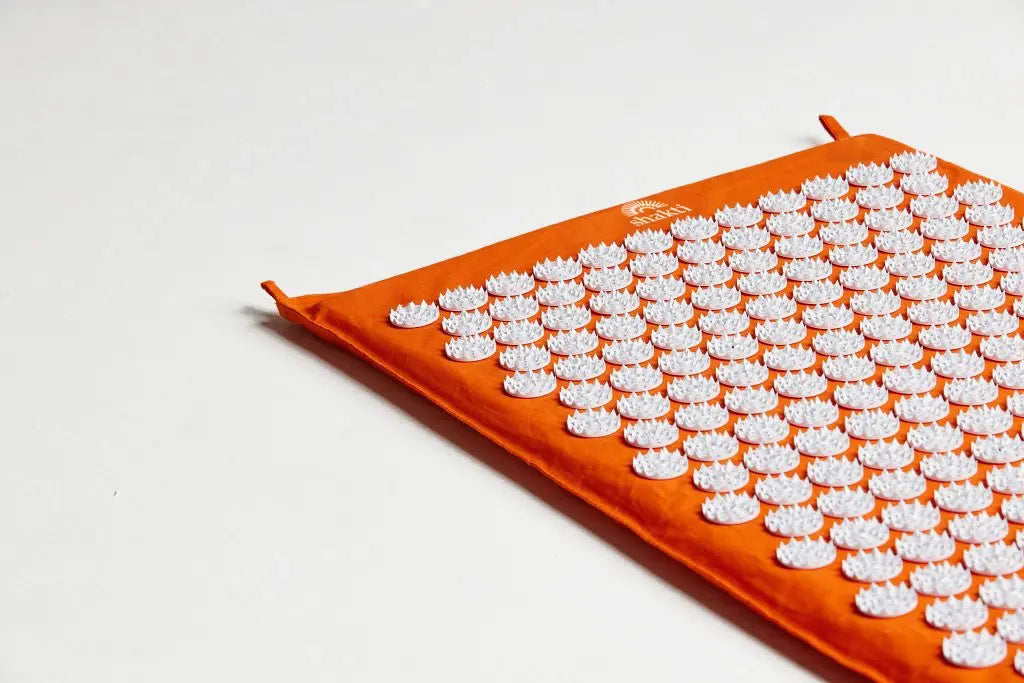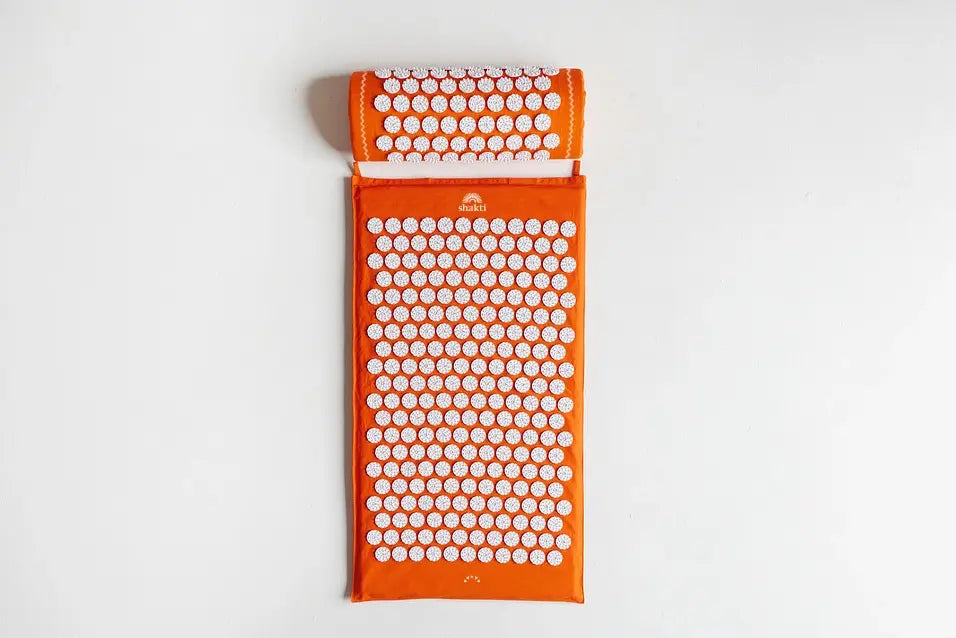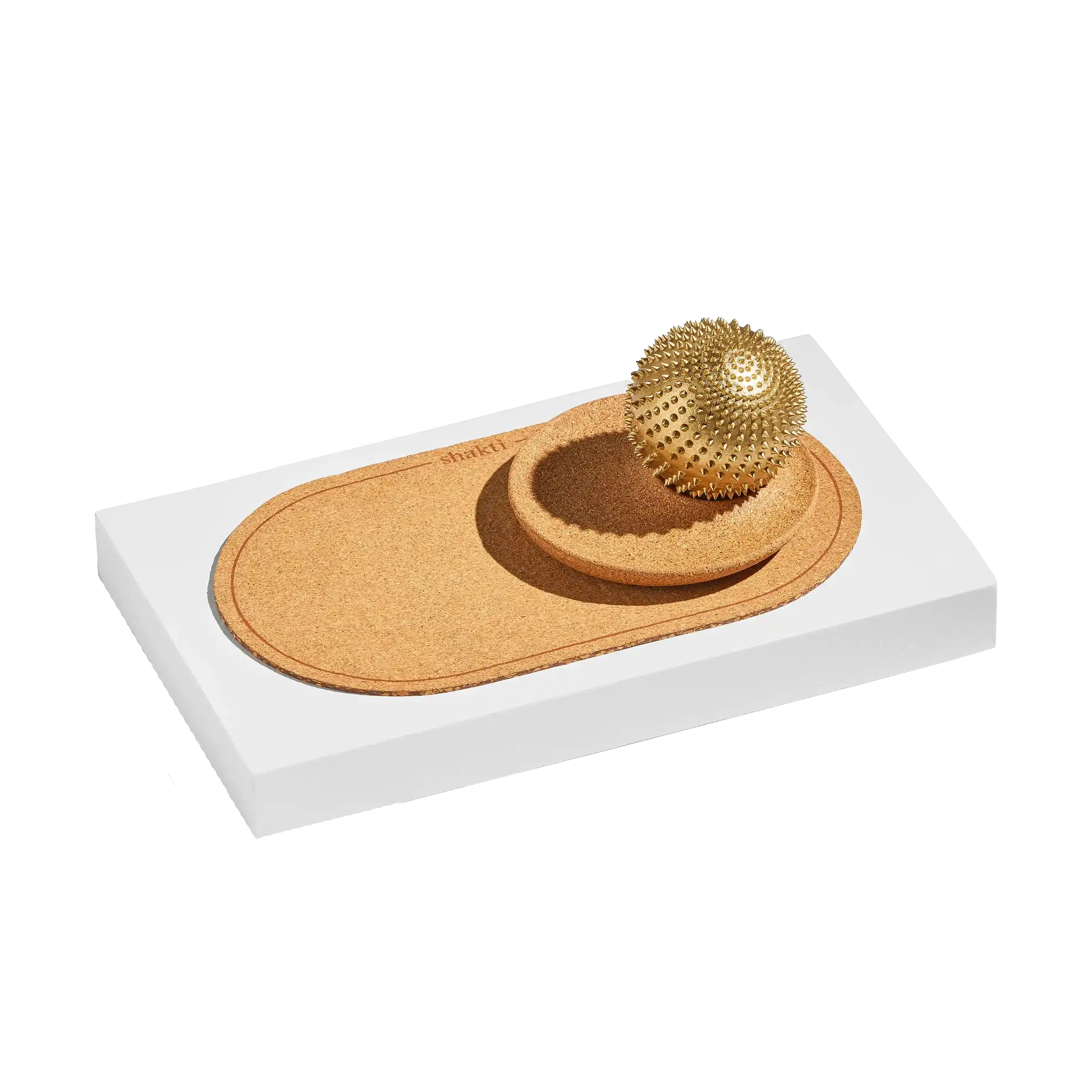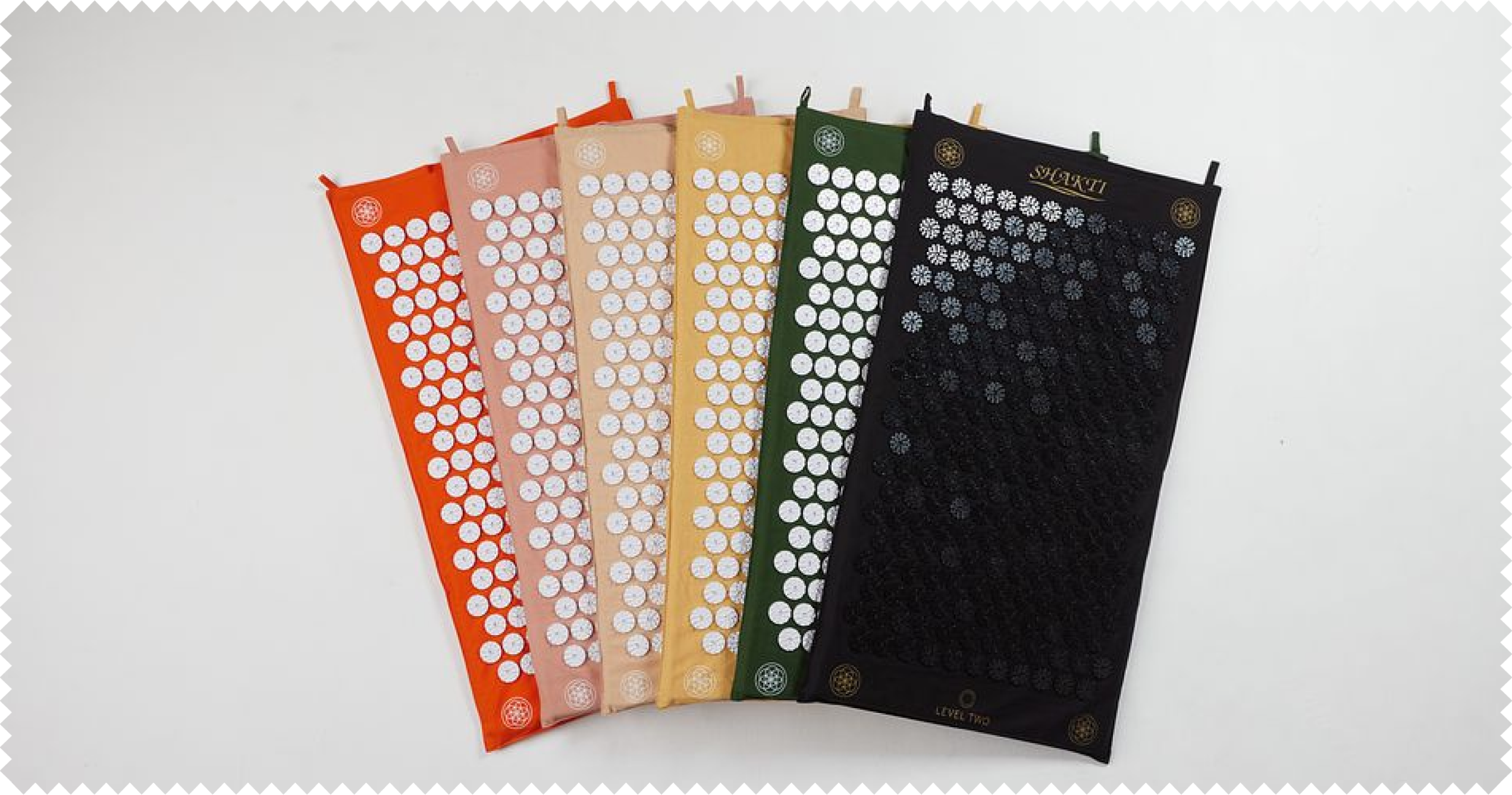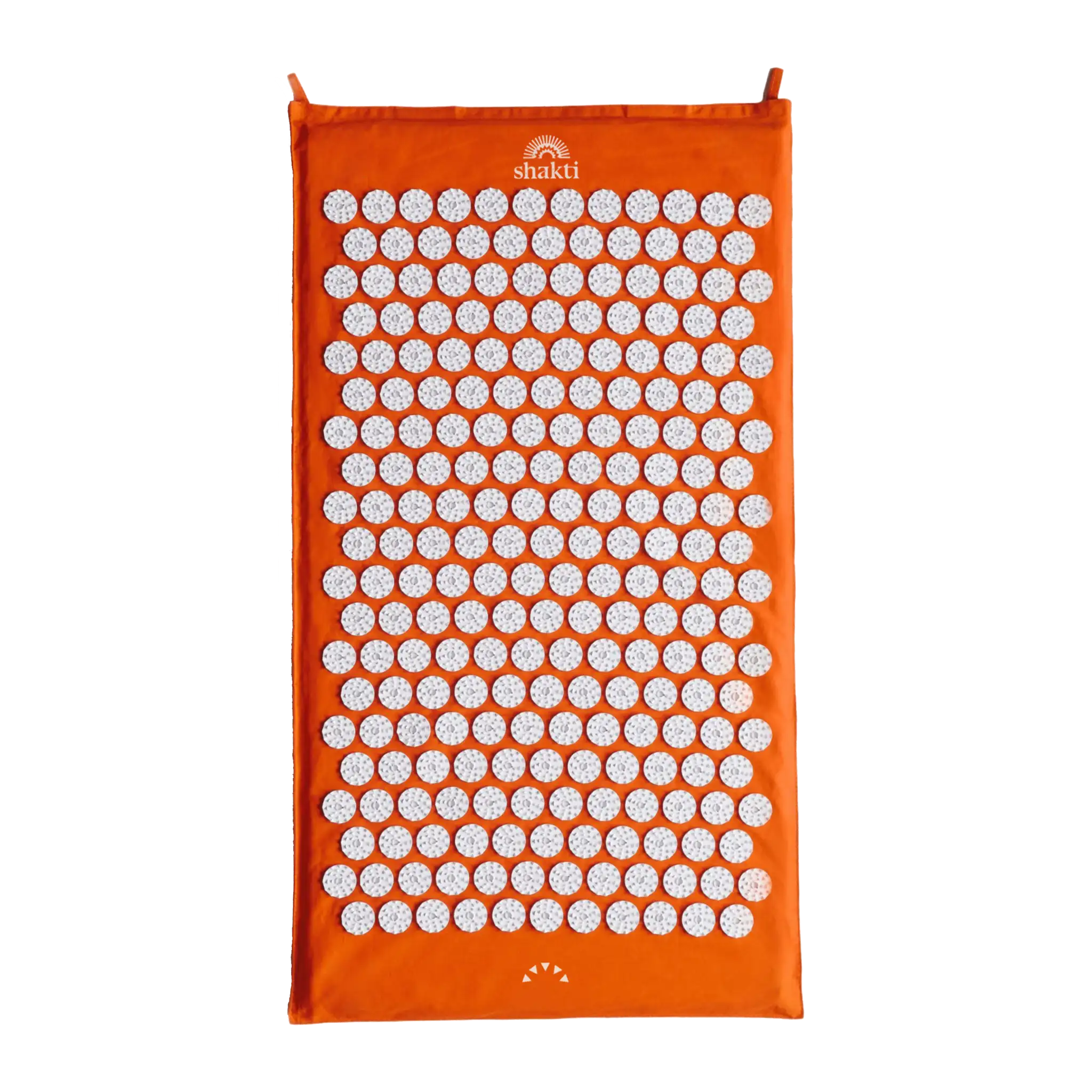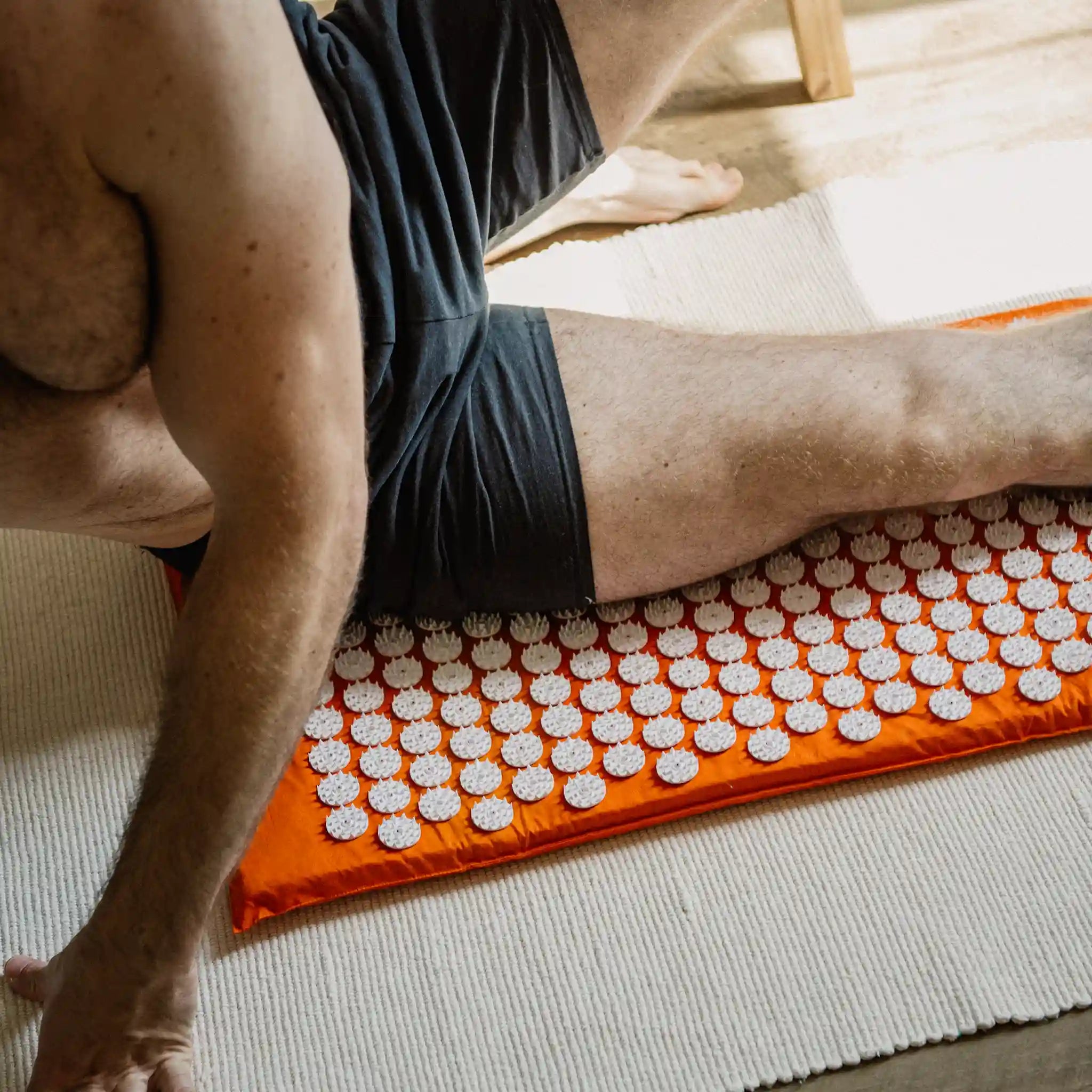That makes stress: symptoms, causes and cure
Table of contents
1 This is how stress arises
2 How stress can change our thinking
3 Interview with Ruth Haremsa on the subject of stress
4 Effects on our body
5 Emotions and stress
6 acupressure exercises for stressful situations
7 An exciting documentary
Support psychosomatic ailments with the Anti Stress Mat
Due to a modern lifestyle, stress is part of everyday life for many of us. Factors such as time pressure, the double burden of family and work, or the increasing use of cell phones promote the production of stress. But stress can also arise from within - triggered by doubts, fears, worries or past experiences that we have not processed.
In principle, stress is not a negative reaction and can spur us on to top performance in the short term. However, if stress becomes a constant companion, it can have long-term effects on our physical and mental health and thus on our quality of life.
A large number of the members of our acupressure mat group on Facebook encouraged us to take a closer look at this topic and write about it - a big thank you for that.
So now, in this post, we'd like to take a closer look at stress and examine it from different perspectives. We would like to take a look at exactly how stress arises, what it causes and what each and every one of us can do to find a way to deal with it and lead a more relaxed life in the long term.
Fortunately, we are not alone in this, but have enlisted the support of Ruth Haremsa . She works as a spiritual healer and alternative practitioner for psychotherapy in Berlin and has shared valuable information on the topic of stress from her own practical experience with us.
This is how stress develops: Chemical processes in the body

All of us have found ourselves in short or long stressful situations. For example, when preparing for an important exam or giving a speech in front of an audience. Usually, your heart starts beating faster, you sweat an unusual amount and your hands start shaking. This is one of many possible situations in which we experience stress symptoms.
In these moments, our body releases the stress hormones adrenaline and noradrenaline. These two neurotransmitters are supposed to help us activate all energy reserves in our system and be fully present - so actually not so bad and certainly useful in many situations.
But what happens when stress production becomes a continuous program? It is said that the body starts to produce the stress hormone cortisol after 15 minutes. So with chronic stress, our adrenal glands produce more hormones. In addition, there is an increased release of the body's own glutamate.
How stress can change our thinking

Lying on an anti-stress mat can lead to relaxation in a few minutes
This also has an influence on our thinking. Chronic stress puts our body in an unnatural state of emergency. The constant production of the stress hormone cortisol drains energy and weakens the immune system, which provides a good breeding ground for both psychological and physical ailments.
Our brain naturally notices these processes and begins to adapt its functioning. Researchers suspect that these processes negatively change cells in the hippocampus. This is an area in the brain that transfers our memories from short-term to long-term memory.
In addition, stress production is also said to have an influence on the frontal lobe in the brain. This is responsible for the rational evaluation of situations. Here, too, changes are observed due to the effects of stress. It is assumed that people who are under constant stress therefore find it more difficult to assess situations correctly for themselves. Instead of remembering positive events, we let our fear center take the lead over feelings and actions.
As a rule, this leads to even more stress and the body has to fight hard to balance out all the stress hormones. And there we are, unfortunately, already in the downward spiral, from which it is often very difficult to get out with your own forces.
An interview with Ruth Haremsa on the subject of stress
At this point it was our heart's desire to let an expert on the subject of spiritual healing have her say. We are very grateful that Ruth Haremsa, who practices as a spiritual healer and alternative practitioner for psychotherapy in Berlin, took the time to answer our questions about stress.

(start interview)
Dear Ruth, what do you think stress is?
Stress is a condition that stops the harmonious flow of our energy and puts our self-regulating system into rigidity. Stress is the emergency program that nature has set up for us to ensure our survival in critical situations. There is no time for idleness here; every move must be made to ensure our bare survival.
Man, however, is not in the world only to survive, but to develop according to his own divine dispositions for the highest good of all. In every human being there are unique potentials which distinguish him and which he is not only invited but challenged to use. Stress creates stagnation, and thus the access to our inherent treasures remains hidden.
We can experience mental, emotional and physical stress. Ultimately, any form of stress causes blockages to occur both energetically and at the cellular level, which also affect our biochemical metabolism. This means that the detoxification function of the body is hindered and the absorption of nutrients and vital substances is reduced. Those who are exposed to frequent stress become increasingly slagged off and run the risk of developing deficiency symptoms and disease symptoms in the long term.
From your practice as a spiritual healer: What is a breeding ground for stress, and what are the causes?
As already mentioned, we can experience stress on all levels. The factors for this can be purely external, such as strong noise, artificial light, great heat or cold, lack of sleep, lack of sunlight, air pollution as well as electrosmog and much more.
Other stress-triggering influences can be exciting news and media sensory overload.
On the level of personal relationships, it is above all the inner-family, partnership or professional conflicts that bring us off center if we do not find a way to clarify and harmoniously resolve them.
I always look at the original experience due to which the system of a person seeking healing is frozen. If it is a matter of psychological factors, such as traumatic experiences from the past, we work accordingly on their healing. In this way the system starts to flow again and relaxes on all levels. The symptoms, such as fears or compulsions, have then mostly served their purpose and can recede.
At this point it should be said that physical ailments always belong in the hands of experienced naturopaths or doctors. We should also be aware that although spiritual healing has an essential part in the healing of ailments, it must always be remembered that the body must also be substantially supported with the targeted administration of vital substances and minerals as well as detoxification measures.
How does stress affect us, our daily lives and the people around us?
The one who is under stress can become blind to the deeper truth that is inherent in himself or herself, and thus pass over one's own needs. He or she becomes accustomed to everyday routines that are no longer questioned. This often perpetuates dysfunctional behaviors that could even be quite easily replaced by better ones if we gave ourselves the opportunity to become aware of them.
Rushing through everyday life also means having less time and attention for your fellow human beings. Relationships can suffer because we are less and less open and compassionate towards each other. Very sensitive people then prefer to withdraw in order not to break down completely. Fruitful encounters thus become rarer and rarer, and quite a few people are threatened with loneliness.
As mentioned at the beginning, we can miss the meaning of our lives if we subject ourselves to the hamster wheel of disagreeable and constant repetition of processes as well as other stress-triggering factors without sufficiently questioning them and striving for remedies. Thus, we condemn ourselves to a meaningless life, mostly serving the interests of others for whom it pays off that we function smoothly and submit without criticism.
What are good conditions for living as stress-free as possible?
"Good conditions" is an elastic term. There are certainly many factors that people evaluate differently. After all, stress is not least a question of personal perception. Some people find it soothing to listen to the radio all day long, while others can't stand it for five minutes. The former may shy away from peace and quiet because it would confront them with themselves, while the latter does not want to be distracted from the essentials by sensory overload.
Basically, I would recommend every person to sit down in peace and quiet and to deal with what specifically means stress for him, and which influences in his life prevent him from perceiving and fulfilling himself and his very own needs. It is ultimately a matter of consciously and lovingly caring for oneself. Many people confuse self-care with self-reward. But the latter is a compensation, i.e. an extreme to be overcome, which can only be resolved through realization and with intimate self-love. In tranquility.
Stress as a cause of various diseases and mental ailments: How do we succeed in alleviating stress?
Depending on the conflict and personal disposition, a person develops stress-related symptoms. On a mental level, he may take refuge in depression, to name just one possibility. This is because the constant excessive demands and the lack of prospects for recovery depress him and cause his zest for life to wane.
This example makes it very clear how important it is for a person to feel the meaning of his life. If this seems to have been lost - what is it still worth living for? However, the life of every human being is full of meaning. We are invited to turn back to ourselves in order to give living expression to this very meaningfulness within us. Sometimes measures that are supposed to alleviate stress turn into the opposite, which is why their effect should be checked.
This is the case with affirmations, for example: If, due to an unhealed traumatic original experience, a certain negative belief is working in us, we cannot simply replace it with its complete opposite. If a person is convinced that he is not lovable, the affirmation "I am the greatest person in the world" will not only not help him, but on the contrary will cause him even more stress. The right thing to do would be to explore the cause, heal it and gradually approach the new, positive way of looking at things.
What can we do at home right now to stay grounded and spiritually uplifted?
Only in loving attention to oneself can a person come to rest, feel truly uplifted and regenerate deeply on all levels. Here his relationship to creation, our spiritual home, becomes tangibly alive. Therefore, I can recommend to everyone to use the time and to devote themselves daily to meditation and spiritual introspection.
There are many ways to practice loving self-care. In addition to mediation, relaxation baths and exercises, applications with lavender, and moderate exercise, among others, help. Clear your body and mind of all negative outside influences and practice compassion and forgiveness, for in this, too, lies a deeply calming power.
The compassionate person has a conscience, and only in honest self-turning can we redeem it from the repressed shadow. The prerequisite for a relaxation that rises from the depths and fills us completely. In this sense: Always stay relaxed!
Thank you so much for answering our questions, dear Ruth!
(end of interview)
How much impact does stress actually have on our bodies?

So stress puts a strain on the mind and leaves its mark in the long term - that much is clear. But now the question arises, what effects does stress have on our physical health?
For a long time, it was believed that body and mind functioned independently of each other. Today, we know that they go hand in hand and that tension on a mental level has an influence on our physical well-being. For example, stress has been shown to weaken the immune system and can have effects on the following areas:
Our musculature.
Back and neck pain are already considered a widespread disease in Germany. We all know that moment when we are in a stressful situation and our entire muscular system tenses or cramps. If this happens more often, tension and blockages develop, which can lead to permanent back pain, neck pain or headaches. So identifying the cause of stress leads to relaxation of our muscular apparatus.
Our heart.
After a heart attack, doctors recommend rest and relaxation. When we are stressed, deposits form on our blood vessel walls that can become quite dangerous. A conscious and balanced lifestyle therefore also protects our heart and supports its function.
Our ears.
For conditions such as tinnitus, there is often no explanation as to the cause. When we feel stressed, our immune system shuts down and pathogens can enter the middle ear more easily. The brain then tries to counteract and develops ringing in the ears or whistling, as we know it from tinnitus.
Our intestines.
It's not for nothing that we say "the stomach/intestine tightens up" when we find something very stressful. If we are under stress for a long time, the intestines become more permeable, pathogens have an easier time and our intestines become inflamed. Intestinal problems are therefore also often caused by stress.
...and that's just a small list of the ailments caused by stress. As you can imagine, the actual list is much longer.
Emotions also take place in the body: An exercise for everyday life

So feelings are much more than a matter of the head. Some scientists assume that emotions and feelings such as stress are directly linked to physical reactions. In science, this is called "somatic markers" or "psychosomatics.
Every person has different physical reactions when it comes to certain emotions or feelings. Some people feel butterflies in their stomach, others feel queasy in the stomach area, and still others get stomach or intestinal cramps or have to throw up. This is just one example and can be transferred to many other areas of the body, such as headaches, migraines and so on.
A little experiment can go a long way here: The next time you feel a certain emotion, you can sit down, close your eyes, and feel exactly where that emotion is located. Is it your chest that is tightening or burning? Is it your jaw that's tense? Or is it your stomach turning once?
If you practice this technique regularly, you can get in touch with your body and understand it as an inner wisdom and guide. This will also help you interpret physical ailments and discover their cause.
Now it's time to tackle stress: acupressure exercises to relieve stress on body and mind
Traditional Chinese Medicine (TCM) is based on the assumption that our life energy, also called Qi, flows through various channels called meridians. Once our life energy is blocked, we also notice this in the body and may become ill.
Based on this, there are many different points in the body that we can press using acupressure to help our body with symptoms. Below we have selected three acupressure points for stress symptoms that can support you in emotionally challenging situations.
Acupressure point LI-4 against stress and emotional tension
You can find this point by feeling along the wrist with your index finger. The point is located where you feel an indentation and where the bones of your thumb and index finger meet. Press firmly for at least 10 seconds and repeat as needed. This will help your muscles relax and harmonize the flow of your life energy.
Important note: Please DO NOT use during pregnancy, because it can cause premature labor.

Acupressure point GB-20 leads to relaxation
If you move from the center of your neck towards your ear, the acupressure point GB-20 is located in the hollow, almost halfway between the ear and the spine. You can press this point with both hands on both sides at the same time. If it feels "empty", you can increase the pressure. If the point feels "full", apply less pressure.

Press the pause button and lie down on your ShaktiMat
Time and again, Shakti users report that they use the ShaktiMat as a tool in everyday life to consciously allow themselves breaks and switch off. Especially with children, work and/or other responsibilities, one's own relaxation can sometimes fall by the wayside.
The miraculous thing about the ShaktiMat is the sharp spikes that get your muscles to let go, stimulate endorphin production and get your mind off things. Setting aside 20 minutes a day just for you can help you minimize stress symptoms and strengthen your immune system.
If you want to increase the effect, you can listen to sounds that let you relax even deeper. Our co-founder and in-house DJ Stephanos has created a mix of Tibetan sounds and meditative healing soundscapes that are guaranteed to get you down. Listen to it here in our Sound Cloud Channel .

How a documentary motivates us to trust in our self-healing powers
As part of the research for this blog post, we watched the documentary "Heal" (currently available on Netflix). Director Kelly Noonan Gores shows in both a scientific and spiritual way that our thoughts, beliefs and emotions also have a major impact on our physical health.
Even recent studies agree that we are not at the mercy of our genetic information, nor should we always trust scary predictions, but have more control over our mental and physical health than we were once taught.
"Heal" helps viewers understand how valuable mental health can be in managing physical ailments and trusting in the self-healing powers that are inherent in each of us from birth.
How much relaxation will you allow into your life?

We hope that with this blog post we could encourage you to look at stress from a new perspective. For example, to recognize it as a helper, where in your life you can allow more rest and be more gentle with yourself.
Of course, we don't want to make any false promises. Sustainable and long-lasting stress reduction will certainly require more than just a blog post - namely time and awareness.
But we can tell you this much: If you start analyzing your external and internal stress factors and make lasting changes to them, your life will soon become healthier and happier.
If you feel like sharing with other acupressure mat enthusiasts, visit our group on Facebook.
Otherwise, we always welcome feedback in the comments or an email about your personal experiences with stress.
Sources for this article:
© Photos by: Grit Siwonia


